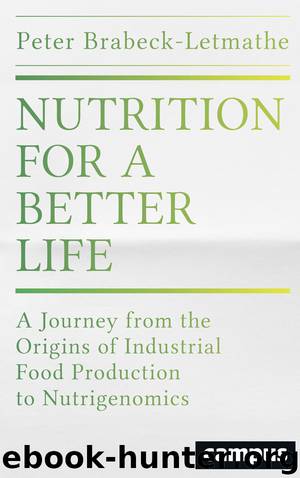Nutrition for a Better Life by Peter Brabeck-Letmathe

Author:Peter Brabeck-Letmathe
Language: eng
Format: epub
Tags: Nahrungsmittelgewerbe, Funktionelle Lebensmittel, Nahrungsmittel, Genetik, Biologische Daten, Genom, Food industry, Functional food, Food, Genetics, Biological data, Genome, Nahrungsmittelindustrie, Nahrungsmittelhandwerk, Lebensmittelindustrie, Genußmittelgewerbe, Genussmittelgewerbe, Ernährungswirtschaft, Ernährungshandwerk, Zuckerersatzstoff, Süßstoff, Künstlicher Süßstoff, Kalorienreduziertes Nahrungsmittel, Kalorienarme Nahrung, Imitationsprodukt (Nahrungsmittel), Imitat für Nahrungsmittel, Gesundheitskost, Ersatzstoff für Nahrungsmittel, Diätnahrung, Diätkost, Sportlernahrung, Schlankheitskost, Saccharin, Reformkost, Nahrungsmittelersatzstoff, Light-Nahrungsmittel, Lebensmittelimitat, Lebensmittelersatzstoff, Lebensmittel, Nahrung, Vererbungslehre, Molekulargenetik, Humangenetik, Medizinische Daten, Körpergröße, Humane Biodaten, Hormonwerte, Biodaten, Food processing industry, Sweetener, Health food, Food substitute, Diet food, Medical data
Publisher: Campus Verlag
Published: 2016-03-14T16:00:00+00:00
Biomarkers help diagnosis
Since the epigenetic modifications only change gene expression and not the gene sequence, epigenetic biomarkers can be obtained from the expression profiles of epigenetically controlled genes. Characteristic biological features, which are objectively measured, are referred to as biomarkers. These may be cells, gene products or certain molecules such as enzymes or hormones. Biomarkers can be indicators of susceptibility to disease and may be able to differentiate between who reacts to certain food components or not (responders and non-responders). Finally, they can discover the bioactive, beneficial components of foods. All nutrients have at least indirect effects on gene and protein expression and thus on metabolism.
Epigenetic biomarkers may have the potential to diagnose diseases in early childhood that are likely to occur in adulthood. When one is able to recognize a disease before any symptoms occur, one might be able to develop new therapeutic approaches for the prevention and treatment of disease and ultimately provide appropriate nutritional concepts. However, this requires extensive knowledge of the human epigenome, and we have still same way to go on that.6
Created in 2006, the international Epigen Global Research Consortium, supports scientists at research institutions in England, New Zealand and Singapore. The Consortium is a joint venture of public and private institutions and cooperates with Nestlé. The diet of mothers and infants is one of the most important research projects undertaken by the Consortium. Due to its international scope, mothers and infants are investigated in different regions of the world representing very different genetic backgrounds and lifestyles in order to find out what effect the eating habits and living conditions of pregnant women have on the genes and health of their children.7
The Epigen Consortium has already proven that the diet of pregnant women directly affects the DNA of their infants. For example, if pregnant women do not eat enough carbohydrates, it can result in their children being exposed to an increased risk of diabetes, obesity or cardiovascular disorders. It is therefore important that the nutritional status of young women before pregnancy is optimal. To this end, a large-scale study of 1,800 young women, who have to take special nutrients up to twice daily, has been performed.
Researchers hope to be able to demonstrate the positive impact of improved nutrition in the development of children. If successful, it could lead to dietary recommendations for the general population. It has already been scientifically proven that the diet of children in the first 1,000 days of their upbringing has a major impact on their future health.
Further studies undertaken by the Consortium Epigen provided evidence of a link between the epigenetic markers in the gene HES1, which is involved in brain development at birth, and later school performance. These findings were supported by laboratory studies. From them they concluded that brain development before birth has a much greater impact on the later learning ability of a child than previously thought. Research must now uncover how the lifestyle and emotional wellbeing of an expectant mother affects the epigenetic processes in the development of a child.
Download
This site does not store any files on its server. We only index and link to content provided by other sites. Please contact the content providers to delete copyright contents if any and email us, we'll remove relevant links or contents immediately.
Nutrition for Sport, Exercise, and Health by Spano Marie & Kruskall Laura & Thomas D. Travis(3784)
Nutrition for Sport, Exercise, and Health by Marie Spano & Laura Kruskall & D. Travis Thomas(3734)
The Sprouting Book by Ann Wigmore(3592)
Flavor Flours by Alice Medrich(2866)
Superfood Smoothie Bowls: Delicious, Satisfying, Protein-Packed Blends that Boost Energy and Burn Fat by Chace Daniella(2485)
Memory Rescue by Daniel G. Amen(2426)
Dirty Genes by Ben Lynch(2318)
The Bad Food Bible by Aaron Carroll(2275)
Genius Foods by Max Lugavere(2222)
The Poisoner's Handbook by Deborah Blum(2141)
Good Calories, Bad Calories by Gary Taubes(2113)
The Main Street Vegan Academy Cookbook by Victoria Moran(2089)
The I Quit Sugar Cookbook by Sarah Wilson(2042)
Core Performance Essentials by Mark Verstegen(2014)
Memory Rescue: Supercharge Your Brain, Reverse Memory Loss, and Remember What Matters Most by Amen Dr. Daniel G(1980)
Big Girls Do It Stronger by Jasinda Wilder(1964)
Android App Development by Franceschi Hervé J.;(1845)
Sugar Crush by Dr. Richard Jacoby(1801)
Dr. Colbert's Keto Zone Diet by Don Colbert(1654)
